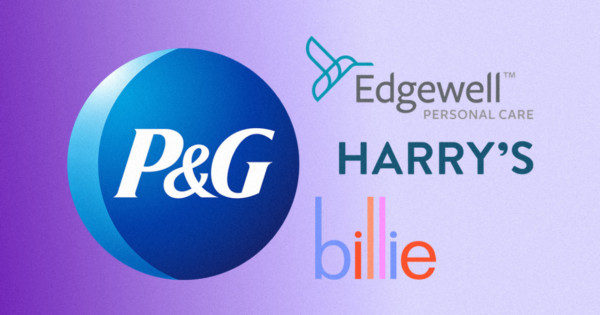
Last week, the Federal Trade Commission announced it was filing a suit to halt Procter & Gamble’s acquisition of Billie, a direct-to-consumer razor brand.
If that sentence inspires an episode of déjà vu, there’s a reason: Not even a year ago, the FTC filed another suit to block a similar acquisition, that of Harry’s, another DTC razor brand, by personal care giant Edgewell.
What happened to Harry’s after that suit was filed offers a blueprint for what may occur with Billie as well: A week after the suit was announced, Edgewell backed out of the acquisition, citing the resources that would have been required to fight the suit in court, as well as the uncertainty of the result. Harry’s subsequently threatened legal action, though no suit has yet come to fruition.
When Edgewell backed out, co-CEOs, Jeff Raider and Andy Katz-Mayfield, summed up the company’s next steps in a statement: “Moving forward, we will continue to do what we do best: develop, manufacture and sell exceptional products at an honest price, and always put our customers first.” Read: Harry’s will continue on as before. Now, it seems Billie is set to suffer a similar fate.
The FTC’s suit comes at a time when antitrust laws have bubbled up to the top of the consumer consciousness. Major mergers—much more high profile than either Harry’s/Edgewell or Billie/P&G would have been—have occurred over the past few years, including Disney’s purchase of 20th Century Fox in March 2019, AT&T’s purchase of TimeWarner in June 2018 and the Viacom-CBS merger in August 2019. And the FTC (along with 48 states) sued to break up Facebook last week and Google is at the center of an antitrust lawsuit of its own.
These razor brand acquisitions are no small potatoes—Edgewell was going to pay $1.37 billion for Harry’s. But they’re not on the scale of, say what the FTC has been doing with regard to Facebook. After all, one’s a tool that serves as a primary way nearly three billion people worldwide get information and news, while the other is a more simple CPG item. Still, these DTC product deals have clearly become a sticking point for the FTC.
In part, the FTC appears to be serving up a warning sign to other DTC brands hoping to be snatched up by CPG conglomerates. But main reason is that the agency is looking to address a situation exclusive to that category.
“When you have only a small number of incumbent suppliers, who have often had large market share for quite some time, who are being challenged by disruptive competitors, there’s a real push to try and preserve that disruptive potential of these nascent competitors,” said Ben Gris, a partner in the Antitrust practice at Shearman and Sterling LLP. “The concern that the FTC is articulating is that they’re trying to buy that threat out, rather than have to compete against it.”
It’s true that the world of razors is a small one, in terms of the numbers of brands in the space. There are two major legacy players, Gillette, owned by P&G, and Schick, owned by Edgewell. The category was one of the first to be hit by the DTC disruption, first, for men, with Dollar Shave Club, in 2011, then with Harry’s in 2012. The shakeup to the women’s category came a little later, with the launch of Billie, which is targeted towards women in 2017, and Harry’s launching a women’s line of its own, Flamingo, in 2018.
https://www.adweek.com/retail/the-ftc-keeps-throttling-razor-brand-acquisitions-but-it-doesnt-spell-doom-for-the-dtc-world/

